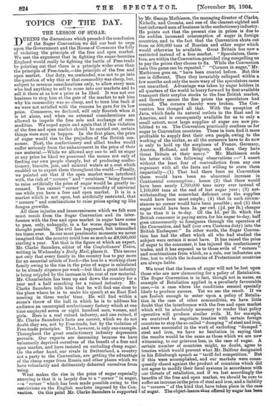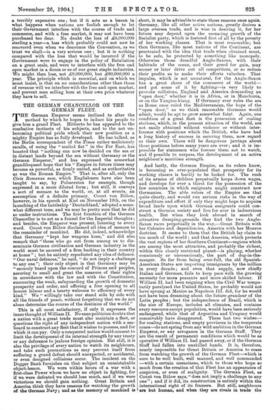THE LESSON OF SUGAR.
DURING the discussions which preceded the conclusion of the Sugar Convention we did our best to urge upon the Government and the House of Commons the folly of violating the principle of the free and open market. We met the argument that in fighting the sugar-bounties England would really be fighting the battle of Free-trade by pointing out that there is a principle wider even than the principle of Free-trade,—the principle of the free and open market. Our duty, we contended, was not to go into the question of why this or that commodity was cheap, but, subject to revenue considerations only, to allow every man who had anything to sell to come into our markets and to sell it there at as low a price as he liked. It was not our business to stop him at the gate of the market to ask him why his commodity was so cheap, and to turn him back if we were not satisfied with the reasons he gave for its low price. Commerce, we declared, will only flourish when it is let alone, and when no external considerations are allowed to impede the free sale and exchange of com- modities. We urged again and again that if this violation of the free and open market should be carried out, certain things were sure to happen. In the first place, the price of sugar would rise to the prejudice of the British con- sumer. Next, the confectionery and allied trades would suffer seriously from the enhancement in the price of their raw material.—While we allowed any one to sell us sugar at any price he liked we possessed the means not only of feeding our own people cheaply, but of producing confec- tionery, biscuits, jam, and mineral waters at a, cost which enabled us to export them throughout the world.—Finally, we pointed out that if the open market were interfered with, the risk of " corners " and " combines " being formed to raise artificially the price of sugar would be greatly in- creased. You cannot " corner " a commodity of universal use while you have a free and open market. It is in a market which is not open, but artificially restricted, that " corners " and combinations to raise prices spring up like fungus growths.
All these injuries and inconveniences which we felt sure must result from the Sugar Convention and its inter- ference with the free and open market in sugar have come to pass, only, unhappily, in a far worse degree than we thought possible. The evil has happened, but intensified ten times over. In our most pessimistic moments we never imagined that the country could lose as much as £8,000,000 sterling a year. Yet that is the figure at which an expert, Mr. Clarke Saunders, editor of the Confectioners' Union, writing in Wednesday's Daily Mail, places it. This means not only that every family in the country has to pay more for an essential article of food.—the loss to a working-class family owing to the rise in the price of sugar is calculated to be'already sixpence per week—but that a. great industry is being crippled by the increase in the cost of raw material. Mr. Chamberlain has been up and down the country for a year and a half searching for a ruined industry. Mr. Clarke Saunders tells him that he will find one close to the place where he is to make his speech at an East End meeting in three weeks' time. He will find within a stone's throw of the hall in which he is to address his audience an unoccupied confectionery factory which at one time employed seven or eight hundred men, women, and girls. Here is a real ruined industry, and one ruined, if Mr. Clarke Saunders's facts are correct, which we do not doubt they are, not by Free-trade, but by the violation of Free-trade principles. That, however, is only one example. Throughout the great confectionery industry depression prevails. Our exports are decreasing because we have voluntarily deprived ourselves of the benefit of a free and open market, and have insisted on excluding cheap sugar. On the other hand, our rivals in Switzerland, a country not a party to the Convention, are getting the advantage of the cheap sugar from Russia and other places which we have voluntarily and deliberately debarred ourselves from using.
What makes the rise in the price of sugar especially annoying is that it is largely due to a " corner " in sugar, —a " corner " which has been made possible owing to the restrictions on the English markets imposed by the Con- vention. On this point Mr. Clarke Saunders is supported by Mr. George Mathieson, the managing director of Clarke, Nicholls, and Coombs, and one of the clearest-sighted and best-informed men of business inthe confectioneryindustry. He points out that the present rise in prices is due to the sudden increased consumption of sugar in foreign countries, and to the fact that the Convention shuts out from us 500,000 tons of Russian and other sugar which would otherwise be available. Great Britain has now a restricted instead of a free market. " Speculators, there- fore, are within the Convention-provided ring compelling us to pay the prices they choose to fix. While the Convention lasts this game can be repeated." "Corners in sugar," Mr. Mathieson goes on, " have been created before. But this one is different. Then they invariably collapsed within a few months and only the more wary of the speculators came out unscathed. Advantage was taken by sugar holders in all quarters of the world to hurry forward by first available transport their surplus stocks to the free British market, and thereby secure the fine prices the speculators had created. The corners thereby were broken. The Con- vention has changed all that. With the exception of Java, which finds its natural outlets in the East and in America, and is consequently available for us to only a small extent, most large supplies of sugar are now pro- hibited to us. The Convention practically confines us for sugar to Convention countries. These in turn find it more profitable to supply first their own people, owing to the working of the surtax, so all the cornerers have to do now is only to hold up the surpluses of France, Germany, Austria, Holland, and Belgium, and then they have Great Britain at their mercy." Mr. Mathieson ends his letter with the following observations :—" I assert without the least fear of contradiction from any one cognisant with all the facts and willing to state them impartially—(1) That had there been no Convention there would have been no abnormal increase in Continental consumption ; hence (2) that there would have been nearly 1,700,000 tons carry over instead of 1,100,000 tons at the end of last sugar year ; (3) not- withstanding the somewhat deficient crop the supplies would have been most ample ; (4) that in such circum- stances no corner would have been possible ; and (5) that sugar would have been 5s. per cwt. (id. per lb.) cheaper to us than it is to-day. Of the ld. per lb. which the British consumer is paying extra for his sugar to-day, half goes unnecessarily to foreigners through the operation of the Convention, and half (our own Customs duty) into the British Exchequer." In other words, the Sugar Conven- tion has had the effect which all who had studied the subject were certain it must have. It has raised the price of sugar to the consumer, it has injured the confectionery trades, and it has exposed us to those evils of " corners ' and combinations from which, as a rule, our industries are free, but to which the industries of Protectionist countries are always liable.
We trust that the lesson of sugar will not be lost upon those who are now clamouring for a policy of Retaliation. The Sugar Convention is in fact, though not in name, an example of Retaliation applied in a peculiarly favourable case,—in a case where the conditions seemed specially likely to produce success. Yet we see the result. If we are foolish enough to enter upon a policy of Retalia- tion in the ease of other commodities, we have little doubt that the interference with the free and open market which will be absolutely necessary to render that policy operative will produce similar evils. If, for example, we contrived to negotiate treaties with certain foreign countries to stop the so-called " dumping " of steel and iron, and were successful in the work of excluding "dumped " steel and iron, we have no hesitation in saying that the results would be the same as those which we are now witnessing, to our grievous loss, in the case of sugar. A certain number of countries might, no doubt, agree to treaties which would prevent what Mr. Balfour designated in his Edinburgh speech as " tariff-fed competition." But if this were accomplished, and our markets were conse- quently closed against the product of countries which did not agree to modify their fiscal systems in accordance with our threats of retaliation, and if we lost accordingly the benefits of the free and open market, we should be sure to suffer an increase inthe price of steel and iron, and a liability to " corners " of the kind that have taken place in the case of sugar. The object-lesson thus offered by sugar has been a terribly expensive one ; but if it acts as a lesson in what happens when nations are foolish enough to let their Government interfere with the course of trade and commerce, and with a free market, it may not have been purchased too dear. No doubt the loss of £8,000,000 sterling a year—a loss which probably could not now be recovered even when we denounce the Convention, as we trust we shall—is a very serious one ; but it is nothing compared with the loss that would be incurred if the Government were to engage in the policy of Retaliation on a great scale, and were to interfere with the free and open market in a dozen or so of our great staple industries. We might then lose, not £8,000,000, but £80,000,000 a year. The principle which is essential, and on which we must insist, is that on no considerations other than those of revenue will we interfere with the free and open market, and prevent men selling here at their own price whatever they have to sell.















































 Previous page
Previous page